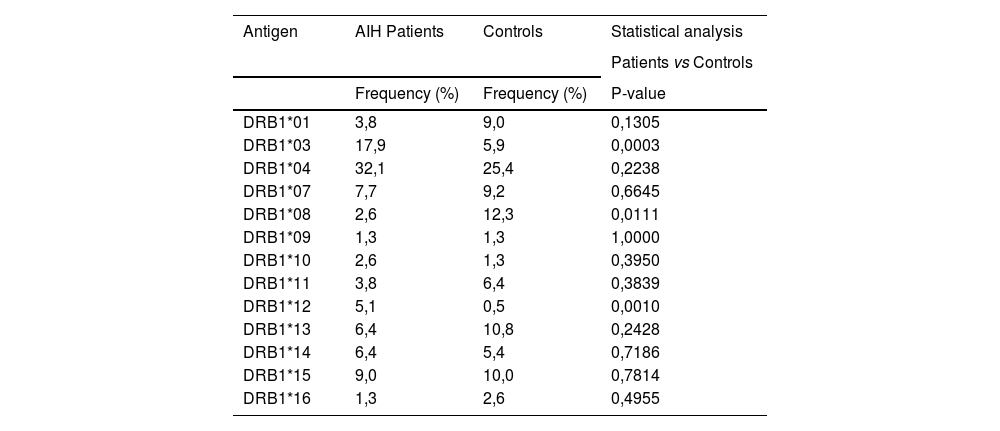
Abstracts of the 2024 Annual Meeting of the ALEH
Más datosNo
Introduction and ObjectivesGenetic predisposition for autoimmune hepatitis (AIH) has been associated with the presence of specific HLA-DRB1 alleles and/or motifs which vary depending on the population in which they are studied. Besides different genetic and environmental factors influencing the development of AIH in different populations, low and medium resolution typing methods might also impair the identification of critical variants in HLA-DRB1 associated with AIH.
The aim of this study was to identify the principal genetic determinants in HLA-DRB1 in an adult population that act as risk factors for the development of AIH.
Patients / Materials and Methods39 patients and 195 controls were typed for HLA-DR by sequence-based typing, and the allele groups associated with the disease in the population of study were identified.
Using sequence data, previously reported epitopes with proposed association with the disease were identified in the population of study.
Results and DiscussionDRB1*03 and DRB1*12 allele frequencies were significantly higher in patients than in controls. Allele DRB1*04 had a higher frequency in patients than controls although this difference was not significant. Moreover, the frequency of allele DRB1*08 was significantly lower in patients than in controls. The only reported motifs that showed an association with AIH in studied patients was LLEQKR and Lysine 71.
ConclusionsThe main HLA-DRB1 alleles associated with type 1 AIH in the population of study are DRB1*03 and DRB1*12, and epitopes LLEQKR 67-72 and Lysine 71 were the only reported epitopes associated with the disease. The differences in alleles and epitopes observed in studied patients, especially when compared to studies from other Hispanics with similar populations likely reflect differences in genetic composition, exposure to distinct pathogens and antigens that can trigger autoimmunity and/or the use of more precise HLA typing methods in this study.
| Antigen | AIH Patients | Controls | Statistical analysis |
|---|---|---|---|
| Patients vs Controls | |||
| Frequency (%) | Frequency (%) | P-value | |
| DRB1*01 | 3,8 | 9,0 | 0,1305 |
| DRB1*03 | 17,9 | 5,9 | 0,0003 |
| DRB1*04 | 32,1 | 25,4 | 0,2238 |
| DRB1*07 | 7,7 | 9,2 | 0,6645 |
| DRB1*08 | 2,6 | 12,3 | 0,0111 |
| DRB1*09 | 1,3 | 1,3 | 1,0000 |
| DRB1*10 | 2,6 | 1,3 | 0,3950 |
| DRB1*11 | 3,8 | 6,4 | 0,3839 |
| DRB1*12 | 5,1 | 0,5 | 0,0010 |
| DRB1*13 | 6,4 | 10,8 | 0,2428 |
| DRB1*14 | 6,4 | 5,4 | 0,7186 |
| DRB1*15 | 9,0 | 10,0 | 0,7814 |
| DRB1*16 | 1,3 | 2,6 | 0,4955 |
Distribution of HLA-DRB1 alleles in patients with type I Autoimmune Hepatitis and controls









